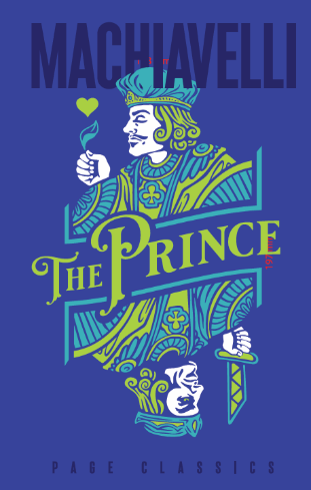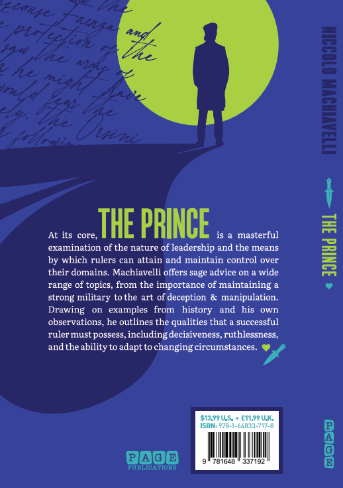The Prince
- Normaler Preis
- $6.99 USD
- Normaler Preis
-
$13.99 USD - Verkaufspreis
- $6.99 USD
- Grundpreis
- pro
Type : Classic Literature
SKU : 9781648337192
Verfügbarkeit für Abholungen konnte nicht geladen werden
The Prince by Niccolò Machiavelli, written in 1513 and published posthumously in 1532, is one of the most famous and influential works on political theory and governance. The treatise offers pragmatic, often controversial advice on power, leadership, and statecraft, making it a foundational text in the study of political science. Written in the early 16th century, The Prince remains remarkably relevant today, sparking ongoing debate about the nature of authority, ethics, and human nature.
Machiavelli's treatise is essentially a manual for rulers—specifically, for those who wish to acquire, maintain, and consolidate political power. Through this work, Machiavelli sought to provide practical guidance for politicians who aimed to govern effectively, whether they were princes, military leaders, or heads of state. Rather than relying on abstract ideals, Machiavelli emphasized the realpolitik approach: focusing on pragmatism and the realities of power, often at the expense of traditional moral principles.
Key Themes of The Prince:
-
Power and Authority: Machiavelli argues that the ends justify the means, a phrase that encapsulates his approach to ruling. He believed that rulers should not be bound by conventional morality if doing so would hinder their ability to maintain power. For Machiavelli, the primary goal of a prince (or ruler) is to secure and hold onto power, even if that requires deception, manipulation, or violence.
-
Virtù vs. Fortuna: One of the central concepts in The Prince is the dynamic between virtù (the qualities of a ruler—courage, intelligence, decisiveness) and fortuna (luck or fortune). Machiavelli argues that a successful ruler must use virtù to shape and control fortuna. While fortune plays a role in events, the prince must be able to adapt to changing circumstances and seize opportunities, showing the qualities of a shrewd and capable leader.
-
The Role of Morality: One of the most controversial aspects of The Prince is its apparent disregard for traditional moral values in favor of political expediency. Machiavelli famously asserts that a ruler may need to act immorally—through manipulation, deceit, or cruelty—to achieve the greater good of the state. He suggests that being feared may be more effective than being loved, but that a wise prince must avoid being hated.
-
The Use of Force and Fear: In Machiavelli's view, force and fear are vital tools for a ruler to maintain control. While he acknowledges that cruelty should be avoided when possible, he emphasizes that it is better for a ruler to be feared than loved, as fear is a more reliable means of control. However, he also warns that a prince should avoid being so cruel as to become despised or hated by his subjects, as this can lead to instability and rebellion.
-
The Importance of Appearances: Machiavelli stresses that perception can be more important than reality. A ruler must be able to project an image of strength, wisdom, and virtue—even if these qualities are not always present in actuality. This is why the art of deception is so important for Machiavelli's ideal ruler.
-
The Role of Military Power: The stability of any state, according to Machiavelli, depends on the strength of its military. He warns against relying too heavily on mercenaries or foreign troops, advising that a prince should always maintain a loyal, well-trained, and well-equipped army to safeguard his rule.
-
Adapting to Circumstances: Machiavelli believes that a successful ruler must be adaptable. Fortune can be unpredictable, so the ruler must be flexible in responding to changing circumstances, whether in war, politics, or social unrest. Prudence and foresight are critical traits for any leader to possess.
Controversial Aspects:
The Prince has been criticized for advocating cynicism and immorality in political leadership. Some critics view Machiavelli as advocating ruthless, unscrupulous tactics in the pursuit of power. His emphasis on manipulation, deception, and the use of force has led to the term "Machiavellian", which is often used to describe a person who is cunning, deceitful, and manipulative for personal or political gain.
However, many readers interpret The Prince as a realistic analysis of the nature of power rather than a manual for tyranny. Machiavelli’s arguments are based on his observations of the political landscape of Renaissance Italy, a time of intense political fragmentation and instability, where states were often in flux, and rulers had to be adaptable and pragmatic to survive. In this sense, The Prince can be seen as a call for strong, effective leadership in times of crisis.
Legacy:
Despite its controversial nature, The Prince remains a foundational text in political theory, influencing not only political leaders and statesmen but also philosophers, historians, and scholars across centuries. The book has shaped the fields of political science, realpolitik, and international relations, and continues to be studied and analyzed for its insights into the nature of leadership, power dynamics, and human behavior.
Machiavelli’s influence extends beyond politics, impacting literature, philosophy, and even popular culture. His exploration of the human psyche, particularly the ways in which people act when seeking power, has been referenced in countless works of fiction, drama, and film.
In conclusion, The Prince offers a pragmatic and sometimes unsettling view of political leadership. Its teachings on power, morality, and governance continue to provoke thought and discussion, making it an essential text for anyone interested in understanding the complexities of political life and human nature. Whether one agrees with Machiavelli’s approach or not, the work challenges readers to reflect on the realities of political power and the difficult decisions leaders must often make.
5.1 x 7.87 (Inches)
128 Pages



